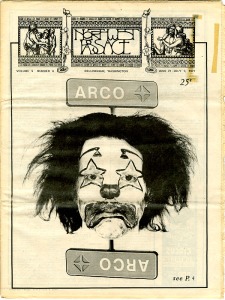The APC originated in the late 1960s, inspired by the political, social, and cultural advocacy of UConn students at that time. The materials in this collection emphasize the importance of grassroots organizations and alternative media in providing different stories and perspectives to a public drowning in mainstream. Unfortunately, most UConn undergrads are unaware that these invaluable research materials are at their fingertips, literally waiting to be examined. I was one of these students until two weeks ago, after being formally introduced to all the resources the Dodd has to offer in subject areas ranging from politics, to women’s studies, to the environment itself. This got me to thinking: what about other students? What about students majoring in Environmental Studies or other areas that deviate from the typical subjects often associated with archival research? Would it even occur to them to look in the APC when researching a historically documented ecological issue? Well it should!
I’ve been digging through the APC archives for a while now and believe me—it’s a gold mine ranging back to the late 1950s and 1960s. I personally struck gold when looking through Northwest Passage, a bi-weekly Bellingham, Washington newspaper printed from 1969 to 1986. The paper grew very popular as far as grassroots news is concerned and it quickly evolved into an ecological
journal with a national subscription base, including a number of mainstream media sources.
Publisher Frank Kathman, one of the three co-founders, boasted: “[W]e soon found that the Passage had a monopoly on environmental information in the Northwest.” Add the newspaper’s penchant for publishing risqué stories on topics such as personal marijuana cultivation, its willingness to include articles and commentaries from subscribers, and the “Molasses Jug,”—a local funk section including everything from old wives’ remedies to advice on herbal supplements—and you’ve got a recipe for underground news success. This recipe was especially savored in Bellingham, because as Kathman asserted, “[It] seemed like a microcosm of the American dream. A place where a small but ambitious paper could really be effective.” It was, indeed, effective—especially when it came to
covering key environmental issues of the period: “[We] made establishment papers look like they were shirking their duties.”
Of course any mainstream paper would have been shamed, had its coverage of the 1971 Anacortes Oil spill, for instance, been compared to the incessant coverage of Kathman’s staff. Northwest Passage had addressed the oil issue for some time before the spill, as the controversial debate raged over expanding ARCO (Atlantic Richfield Company) oil tankers and production in Alaska. The Anacortes incident sent 210,000 gallons of no. 2 diesel oil spilling into the Guemes Channel. The number was initially reported as 5000 gallons, not barrels, delaying action until six to sixteen hours later. Only about 5% of the oil was cleaned, and a study of the previous 1969 spill near the Woods Hole Oceanographic Institute found that bacterial degradation after oil spills is slow. Toxic hydrocarbons remain—especially if diesel fuel is spilled. The most toxic areas dissipate quickly, and cannot be cleaned at all. The Passage was apparently also successful at portending the future. The April 26, 1971
issue included an article titled “Our Fine Feathered Friends,” explaining how to care for birds, should they be harmed by potential oil spills. Author David Wolf concluded his article on a hopeful note: “May we never find ourselves in need of these procedures.” Turns out these procedures would be needed the same day the issue was printed!
Apparently the supposedly archived environmental hot topics of the late 60s and early 70s are still simmering—dare I say boiling?–in the world outside the Dodd Center today.
Krisela Karaja, Student Intern
Resources:
Kathman, Frank. “Passage History.” Northwest Passage [Bellingham, Washington] 15 Mar. – 28 Mar. 1971: Vol. 4 No. 2. Alternative Press Collections. Archives and Special Collections
at the Thomas J. Dodd Research Center, University of Connecticut Libraries.
Northwest Passage [Bellingham, Washington] 10 May – 23 May 1971: Vol. 5 No. 3. Alternative Press Collections. Archives and Special Collections at the Thomas J. Dodd Research Center, University of Connecticut Libraries.
University of Connecticut. UConn EcoHusky. UConn Office of Environmental Policy, n.d. Web. 15 Sept. 2011. http://ecohusky.uconn.edu/.
Wolf, David. “Our Fine Feathered Friends.” Northwest Passage [Bellingham, Washington] 26 Apr. – 9 May 1971: Vol. 5 No. 2. Alternative Press Collections. Archives and Special Collections at the Thomas J. Dodd Research Center, University of Connecticut Libraries.

